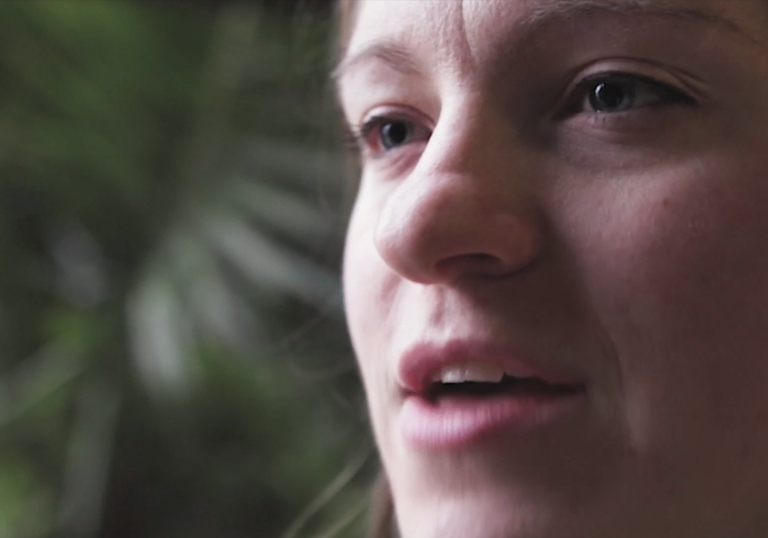What was it about this incident that inspired your poem?
It’s this flippant use of the male-dominated language that sparked my poem for Subject to Change. After all, poetry thrives on the specificity of its language, so what better way to interrogate a word than in a poem?
This instance of gendered language use might be a glaring one, but it certainly isn’t isolated. Words are used to minimise the status of women all the time. It’s a story that’s repeated, everywhere, every day, without making the news. In fact, it’s so far under the radar that many people don’t even notice it happening.
What better way to interrogate a word than in a poem?
The gendered familiar terms for men tend to be things like ‘mate’, ‘bruv’, or ‘man’ – indicating a friendly or relationships, or just a straightforward affirmation of the man’s ‘man-ness’. Either way, it’s a relationship of equals. For women, the terms are different: ‘love’, ‘honey’, ‘sweetheart’, ‘darlin’’. These are all words that suggest a sexual relationship – which is an intimacy which I don’t necessarily want with a man I’ve only encountered once in a customer service role.
One of the many benefits of the #MeToo movement is that more women are speaking out about micro-aggressions. The internet is positively humming with it – and this is another thing that inspired my poem: the coming together of voices, saying that enough is enough. And now, hopefully, people might be starting to listen.
Who do you think writes well on the topic of change?
For me, change is always personal, even when it’s political – perhaps especially when it’s political. Even when it’s a sweeping social movement, the actual change happens internally, perhaps millions of times over, inside each of us. We change in our beliefs, in our identity, in how we align ourselves. It might be an obvious choice, but I don’t think anyone writes about change better than Ovid. I’ve always been fascinated by his Metamorphoses. My mum used to tell my Greek myths as bedtime stories. Some of them are quite violent, so I’m not sure they were always the best thing to get a child off to sleep, but at least it sparked my imagination.
The Metamorphoses are physical changes, literal transformations from one state to the next (people turned into birds, or trees, or a spider) – but they also encapsulate some kind of internal change, in the transformation from hunter to hunted, or from active human to powerless stone. The change occurs within, as well as without. In the identity of the transformed person, something shifts. The Metamorphoses also capture the violence of change: whether it is forced upon us, or is a painful process of realignment we must undergo ourselves. It’s this visceral nature of change that I think keeps Ovid relevant, that inspires so many other writers and artists.
Why do you think poetry is a good way to talk about change?
Poetry is the perfect way to talk about change, because its form is both static and mutable at the same time. What I mean by that is that poems are (often) brief. This means that they can capture a single moment of change in the same way that visual art does; the poem becomes a snapshot of the process of transformation, like photographing a hatchling that’s halfway between egg and chick. But at the same time, poetry works with meter and rhythm. Because of this, there is always a sense of moving on in poetry: it becomes a discussion between past and future, a tension between the current state and the possible.
Poetry itself is also constantly changing as an art form. As one of the oldest art forms, stemming from the stories told in rhythm around the tribal campfire, it has a long and rich tradition of development and transformation. By creating a poem, the writer in some way is speaking to this tradition, through choice of structure, rhyme, meter, line length, regularity or fluidity of line length, and so on. Every poem is in some way about change.
How has poetry changed your life?
I started writing poetry when I was 17. I’d always enjoyed reading – I used to yawn my way through registration at school because I’d been up all night with a book – but poetry wasn’t really a part of that. It was all about fiction. Then, in a sixth form English lesson, our teacher introduced us to Carol Ann Duffy’s The World’s Wife. It was the first time I’d ever read a full collection of poetry. It was the first time I realised that poetry doesn’t always have to be end-rhymed. And it was the first poetry I’d ever read by a living female poet who was openly gay. It was as if the whole world had opened up. All at once, here was a world that I felt I could belong in – it was as if someone had given me permission to seek my own voice, through writing. I suppose in a way, it was my own transformative moment.
Poetry still helps me to remember that I’m not alone, whether that’s in joyful times or in darker ones. (Whatever form of sorrow you’re going through, you can bet that somewhere there’s a poet who’s written about it.) Reading poetry helps remind me of the vastness of human experience, how we all have individual lives that are often impossible to imagine from outside, but that ultimately we’re all the same: we all hurt, and laugh, and fear things, and make friends, and fall out, and weep, and wonder, and smile. We all change.

